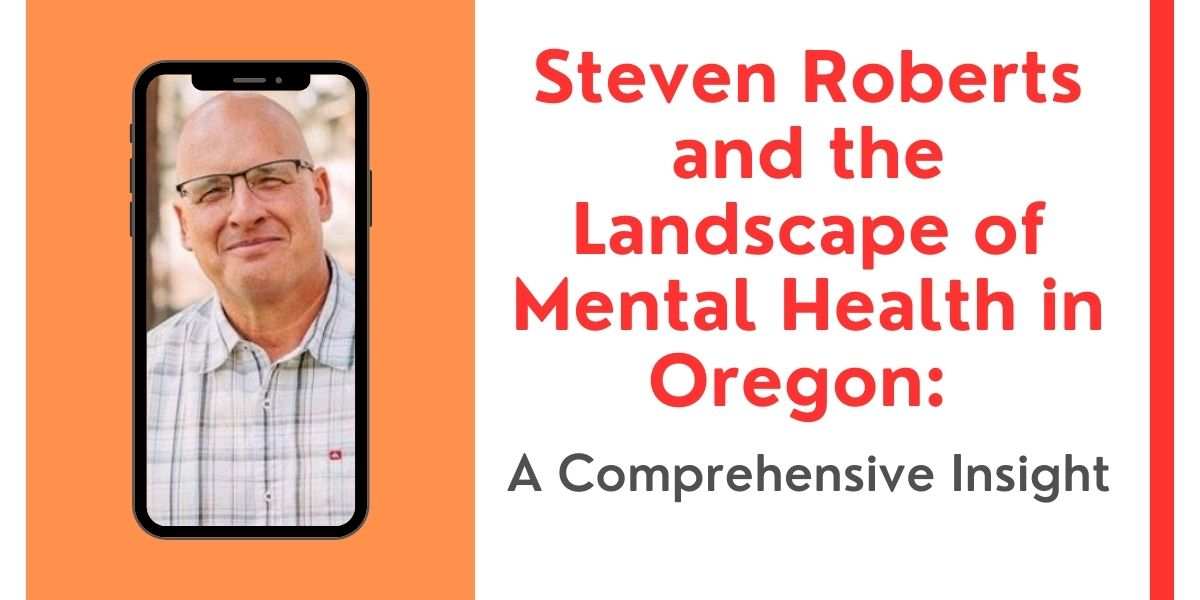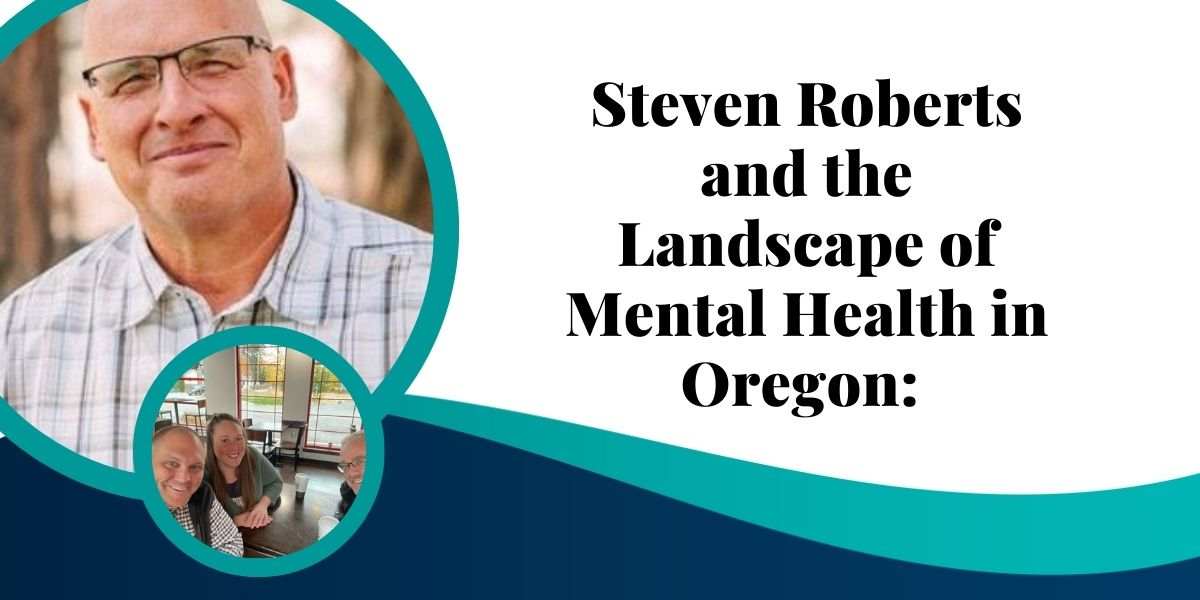Steven Roberts and the Landscape of Mental Health in Oregon: Explore the impact of Steven Roberts on Oregon’s mental health system. This comprehensive guide covers his contributions, challenges in mental healthcare, and future implications—ideal for students and professionals.
duction: Why Mental Health in Oregon Demands Our Attention
In the heart of the Pacific Northwest lies Oregon—a state known for its breathtaking landscapes, progressive policies, and community-centered health care initiatives. Yet, beneath its natural beauty and social progressivism, Oregon faces a mental health crisis that has demanded urgent and strategic responses over the past decade. Amid this complex landscape, one name emerges repeatedly in conversations about policy reform, mental health advocacy, and public leadership: Steven Roberts.
But who is Steven Roberts, and why does his name resonate so powerfully within Oregon’s mental health circles?
This article takes a deep dive into Roberts’ influence, shedding light on his background, contributions to mental health policy, and how his efforts are shaping the future of behavioral health care in Oregon. Whether you are a health care professional, a student of psychology, or simply a curious reader, this comprehensive exploration will provide valuable insights into a figure whose work is transforming lives across the state.
Who Is Steven Roberts? A Brief Background
Steven Roberts is a respected public figure in Oregon, known for his leadership in mental health advocacy, policy reform, and community engagement. With years of experience in both governmental and nonprofit sectors, Roberts has become a cornerstone of Oregon’s behavioral health initiatives.
His journey began in local government, where he served in advisory roles focusing on social services, public welfare, and mental health support systems. Over time, his advocacy extended to working with state legislators and mental health coalitions to ensure equitable access to care for Oregonians.
Roberts is widely credited with promoting trauma-informed care approaches, investing in preventive strategies, and enhancing support for underserved populations—including youth, veterans, and individuals experiencing homelessness. He is also a vocal advocate for mental health education in schools, an area he believes is critical for long-term systemic change.
The State of Mental Health in Oregon: A Snapshot
To understand the significance of Steven Roberts’ work, it is important to contextualize it within Oregon’s current mental health landscape.
Oregon consistently ranks among the states with the highest prevalence of mental illness and lowest access to care, according to Mental Health America’s annual reports. In 2023, Oregon was ranked 50th in terms of overall mental health care access, with high rates of depression, suicide, and substance use disorders.
Several key issues contribute to this ranking:
- Shortage of mental health professionals: Rural and urban areas alike struggle with staffing gaps in both public and private mental health services.
- Underfunding: Despite increased awareness, mental health programs continue to suffer from inconsistent state and federal funding.
- Homelessness and addiction: Oregon has one of the highest rates of homelessness in the nation, often linked with untreated mental illness and substance abuse.
- Stigma and lack of education: A persistent societal stigma makes it difficult for many individuals—particularly young people and minorities—to seek help.
These challenges are precisely where Steven Roberts has directed his advocacy, strategy, and leadership efforts.
Steven Roberts’ Key Contributions to Mental Health Reform in Oregon
1. Bridging the Gap Between Policy and People
One of the defining features of Steven Roberts’ career has been his ability to translate complex mental health policies into practical, community-centered programs. While many leaders focus on drafting legislation, Roberts goes a step further—ensuring implementation reaches the communities most in need.
Roberts helped pilot community-based mental health outreach programs across urban centers like Portland and Eugene, which integrated mental health assessments, follow-ups, and culturally sensitive counseling into public health departments. These programs were especially critical in serving marginalized groups such as immigrants, LGBTQ+ individuals, and indigenous communities.
His mantra is simple but powerful: “Policy only matters if it touches the people.”
2. Championing Mental Health Education in Schools
Steven Roberts has long advocated for incorporating mental health education into the K–12 and college curriculum. He believes that early intervention and awareness are key to preventing long-term mental health crises. As part of his efforts, he partnered with the Oregon Department of Education and several school districts to introduce:
- Peer-led mental health workshops
- Teacher training for emotional support strategies
- 24/7 school-based mental health hotlines
- Annual “Mental Wellness Week” with statewide participation
His goal is to destigmatize mental health issues early in life and equip both students and educators with the tools to handle emotional challenges.
3. Legislative Advocacy and Testimony
Behind the scenes, Roberts has been a powerful voice in the legislative chambers of Oregon. His role as a policy advisor and expert witness for various mental health bills has led to significant achievements, such as:
- HB 2387: Funding expansion for outpatient mental health clinics in rural Oregon.
- SB 744: Legislation aimed at integrating behavioral health screenings into primary care visits.
- The Oregon Mental Health Equity Act (2022): A Roberts-endorsed bill designed to reduce racial disparities in mental health services.
Roberts’ input has been crucial in ensuring that these laws are not only passed but properly budgeted and monitored for effectiveness.

4. Building Collaborative Care Models
Inspired by the success of integrated care in states like Massachusetts and Washington, Roberts has promoted a collaborative care model in Oregon. This model connects primary care doctors, therapists, case workers, and social services under one digital system, allowing for seamless communication and better patient outcomes.
Key outcomes of this initiative:
- 30% faster diagnosis of mood disorders
- 20% reduction in ER visits for mental health emergencies
- Higher patient satisfaction and long-term recovery rates
These innovations are now being adopted in multiple counties across Oregon, with Roberts often credited as a key architect behind the success.
5. Focus on Equity and Underserved Communities
Roberts places special emphasis on equity in access. He often says, “Mental health should not be a luxury reserved for those who can afford it—it’s a human right.”
Some of his equity-driven programs include:
- Sliding scale counseling centers in low-income areas
- Mobile therapy vans for rural counties
- Culturally competent therapy in Spanish, Vietnamese, and Somali
- Veterans support programs with trauma-specific care
His equity-first mindset has earned him recognition from advocacy groups, including Mental Health America and the National Alliance on Mental Illness (NAMI).
6. Public Engagement and Social Advocacy
Roberts maintains a high level of public engagement, frequently attending community forums, speaking at universities, and maintaining an open-door policy for citizen feedback. His social media presence is also robust—he often shares mental health tips, policy updates, and motivational content to raise awareness and support.
Some of his popular campaigns:
- #MentalHealthMattersOR
- “Check In, Don’t Check Out” suicide prevention drive
- Instagram Live Q&A with mental health professionals
What Professionals and Students Can Learn from Roberts
For students of psychology, public health, or social work, Steven Roberts offers a living case study in how one person’s commitment can influence policy and social transformation. He exemplifies how leadership is not just about holding office, but about serving real people with real problems.
For health care professionals, Roberts’ interdisciplinary approach—blending psychology, policy, tech, and social justice—is a model worth studying. His emphasis on trauma-informed care and inclusive service delivery provides a roadmap for future systems.
Mental Health Infrastructure in Oregon: Where Do We Stand?
1. The System at a Glance
Oregon’s mental health system is a mosaic of public and private services, ranging from state-funded hospitals and nonprofit counseling centers to teletherapy startups and peer support networks. However, despite decades of investment, accessibility and quality of care remain highly inconsistent.
Currently, Oregon offers:
- 12 state-run psychiatric facilities
- Over 150 community-based mental health organizations
- A growing network of mobile crisis response units
- Telehealth platforms that expanded post-COVID-19
However, only about 35% of adults with mental illness receive treatment, largely due to workforce shortages, insurance coverage gaps, and geographic barriers.
2. The Workforce Crisis
A major roadblock to effective mental health care in Oregon is a severe shortage of licensed professionals. Many counties—particularly rural ones—have no full-time psychiatrists or licensed therapists, resulting in wait times of up to 6 months for an initial evaluation.
Steven Roberts has consistently lobbied for:
- Loan forgiveness for students in mental health programs
- Accelerated licensing for experienced out-of-state practitioners
- Scholarship funds for underrepresented mental health workers
His pressure on the Oregon Health Authority led to a 2024 budget amendment allocating $18 million for workforce development in mental health.
3. Telehealth: A Temporary Solution or Long-Term Tool?
During the COVID-19 pandemic, Oregon saw a 400% increase in telehealth-based mental health sessions. Steven Roberts was one of the earliest advocates for making these services permanent and insurance-compliant.
His proposals resulted in:
- The Oregon Virtual Counseling Network (OVCN)—a public-private coalition offering subsidized therapy online.
- Mobile wellness hubs where individuals without internet access can attend telehealth sessions in privacy.
- Training grants for therapists to obtain teletherapy credentials.
Still, telehealth is not a panacea. Language barriers, digital literacy, and trust issues remain major hurdles—especially in marginalized communities.
4. Housing, Homelessness, and Mental Health
Mental health issues and homelessness are deeply intertwined in Oregon. Over 40% of the state’s unsheltered population lives with untreated mental illness. Roberts identifies supportive housing as a linchpin for solving both problems.
His multi-sector collaborations have led to:
- “Housing First Oregon” pilot programs in Salem and Medford
- Mental health drop-in centers attached to low-income housing units
- Behavioral outreach teams that accompany housing navigators
Roberts often remarks, “You can’t stabilize a mind without stabilizing a life.”
5. Mental Health in Colleges and Universities
College students in Oregon report rising rates of anxiety, depression, and burnout. Roberts has taken a keen interest in supporting this demographic through university partnerships, leading to:
- Peer mentoring programs at Oregon State and University of Oregon
- Campus-based mental wellness centers with 24/7 availability
- Annual mental health audits by student advisory boards
- Grants for BIPOC student mental health support services
Students today are not just recipients but co-creators of solutions, something Roberts sees as vital for sustainability.
6. Intersectionality and Cultural Competence
Roberts has continually emphasized that mental health solutions must be culturally responsive. Oregon is home to a diverse population, including large Latinx, Native American, and Asian communities, each with unique needs.
Programs developed under his guidance include:
- Faith-based counseling partnerships
- Native-led trauma recovery groups
- LGBTQIA+ safe spaces for therapy
- Multilingual hotline and mental health triage services
This nuanced understanding of identity and access has become a benchmark for statewide initiatives.
Challenges That Still Remain
Despite these achievements, Oregon’s mental health system is far from perfect. Some of the enduring challenges include:
- Inconsistent rural access: Many counties still lack full-time mental health teams.
- Insurance denial and coverage gaps: Especially for long-term or complex therapy.
- Stigma in minority communities: Cultural taboos continue to hinder open dialogue.
- Burnout among mental health workers: High caseloads and secondary trauma reduce retention.
Roberts continues to address these through legislative advocacy and partnerships with training institutions, but the road ahead requires deeper, structural investments.
What Makes Roberts’ Approach Unique?
What sets Steven Roberts apart is not just what he does, but how he does it. He combines data-driven strategy with emotional intelligence, listens before legislating, and always places people—especially the vulnerable—at the center of his efforts.
He’s known to sit in therapy sessions (with consent) just to understand what front-line clinicians experience. He walks through shelters at night and attends student mental health focus groups in person. This level of empathy-led governance is rare—and inspiring.
The Post-COVID Mental Health Landscape in Oregon
1. A Mental Health Wake-Up Call
The COVID-19 pandemic laid bare the fragility of global health systems, and Oregon was no exception. As the virus spread, so did anxiety, depression, grief, and burnout—affecting frontline workers, students, parents, and those already vulnerable.
Steven Roberts referred to this as “the mental health pandemic behind the viral pandemic.”
In response, Oregon saw:
- A 300% increase in calls to suicide prevention hotlines
- A surge in adolescent mental health hospitalizations
- A rise in domestic abuse and substance use linked to mental distress
Roberts immediately mobilized crisis teams, expanded telehealth availability, and called for emergency funding at both state and federal levels.
2. Post-Pandemic Recovery Plans
One of Roberts’ major post-COVID initiatives was the Mental Health Recovery Blueprint, a five-phase action plan designed to rebuild Oregon’s behavioral health systems.
Key components included:
- Short-term crisis stabilization units in hospitals and clinics
- Expanded grief and trauma counseling services for families and healthcare workers
- Mental wellness grants for schools and universities
- Resilience training for health care providers and essential workers
His approach was not just about treating symptoms but building long-term emotional resilience across all populations.
3. National-Level Advocacy and Recognition
As Oregon’s mental health strategy drew attention for its innovation and compassion, Steven Roberts was invited to national platforms to share best practices.
He participated in:
- White House Mental Health Roundtables
- National Governors Association Behavioral Health Task Force
- American Psychological Association (APA) Annual Forum
He advocated for federal mental health parity laws, interstate therapist licensing, and increased Medicaid funding for mental health services. His voice became one of reason, empathy, and policy precision.
4. A Role Model for Students and Emerging Professionals
Steven Roberts’ career is especially instructive for students studying:
- Psychology
- Social work
- Public policy
- Nursing
- Public health
He’s a living example of how interdisciplinary knowledge, empathy, and civic engagement can create meaningful change. Many universities in Oregon now cite Roberts’ policies as part of their curriculum on public mental health systems.
He has also:
- Spoken at commencements and mental health symposiums
- Funded internships for students in behavioral health fields
- Created a mentorship network between professionals and students
5. Workforce Development: Training the Next Generation
Roberts is passionate about solving the mental health workforce crisis through education. His multi-pronged approach includes:
- State-funded scholarships for students from underrepresented backgrounds
- Incentive-based residency programs for mental health practitioners in rural areas
- Partnerships with community colleges to fast-track behavioral health certifications
This “grow-our-own” philosophy ensures sustainability while increasing cultural competence across the system.
6. How Healthcare Professionals Can Get Involved
Health care professionals can engage with Roberts’ mission in multiple ways:
- Join coalition efforts: Through public health alliances and policy advocacy groups
- Volunteer in pilot programs: Like mobile mental health clinics and school outreach
- Mentor students: Especially first-generation college-goers entering behavioral health fields
- Participate in continuing education: On trauma-informed care, DEI (Diversity, Equity, Inclusion), and community-based healing
Roberts often notes, “This isn’t a solo race. It’s a relay—and we need every baton carrier we can get.”
7. Mental Health Tech and Innovation in Oregon
Steven Roberts supports mental health tech startups and innovations, especially those that increase accessibility. He’s been involved in:
- AI-powered symptom checkers for early diagnosis
- Apps for guided journaling and mindfulness
- Remote therapy platforms using VR and augmented reality
- Mental health chatbots available in multiple languages
He sees tech not as a replacement for therapists, but a supplemental tool to increase reach and reduce stigma.

8. Community Voices and Case Studies
Roberts emphasizes the importance of including lived experiences in shaping mental health policies. Through town halls and storytelling projects, he has amplified voices that are often silenced.
One project—“Mind Over Silence”—invited Oregonians to share their recovery stories, later turned into a traveling photo and audio exhibit featured in libraries and schools statewide.
It included:
- Veterans with PTSD finding peace through therapy
- College students overcoming suicide ideation with campus support
- Single mothers balancing medication and motherhood
These real-life accounts add humanity to legislation and keep the system people-centered.
Conclusion: A State of Hope and Progress
As Oregon continues to navigate its mental health journey, Steven Roberts stands as a guiding force. His relentless commitment, compassionate leadership, and results-driven actions have not only saved lives but also transformed systems.
What began as local advocacy has evolved into statewide reform and national influence. Roberts’ work serves as a reminder that mental health is not just about treatment—it’s about justice, equity, education, and human dignity.
His vision? An Oregon where no one is left untreated, unheard, or unloved.
(FAQ)
Q1: Who is Steven Roberts, and why is he influential in Oregon’s mental health system?
Answer: Steven Roberts is a highly respected mental health advocate and public policy leader based in Oregon. With a background in psychology and public health, he has spent over two decades working to reform the mental health system in Oregon through legislation, education, and community-based programs. His influence spans grassroots initiatives to high-level policy advising, making him a central figure in shaping a more inclusive, accessible, and equitable mental health infrastructure across the state.
Q2: What are Steven Roberts’ most notable contributions to mental health reform in Oregon?
Answer: Roberts has led numerous initiatives, including:
- Establishing school-based mental health education programs
- Advocating for equity in mental health care access
- Creating mobile mental health outreach teams for rural areas
- Influencing state legislation like the Oregon Mental Health Equity Act
- Promoting telehealth services and digital mental wellness tools
Q3: How can students get involved in mental health advocacy inspired by Roberts’ work?
Answer: Students can engage by:
- Joining university mental health clubs or peer support groups
- Volunteering at community outreach or mental health hotlines
- Participating in internships or fellowships funded through Roberts’ supported initiatives
- Attending webinars, conferences, and local policy discussions
- Starting mental health awareness campaigns on campus
Roberts frequently partners with colleges to provide resources and mentorship opportunities for students entering the mental health field.
Q4: What support does Oregon offer for students struggling with mental health issues?
Answer: Under the leadership of advocates like Roberts, Oregon has developed:
- 24/7 crisis hotlines for students
- Free on-campus therapy sessions at many public universities
- Mobile apps offering guided meditation and emotional tracking
- Peer support networks funded by the Oregon Health Authority
- Mental health resource kits and resiliency workshops
Q5: How has the COVID-19 pandemic impacted mental health services in Oregon?
Answer: COVID-19 significantly increased mental health challenges, including anxiety, depression, and isolation. Steven Roberts helped Oregon:
- Expand telehealth access for therapy and counseling
- Establish emergency crisis stabilization units
- Secure federal funding for mental health recovery programs
- Provide frontline workers and educators with trauma support
These efforts have led to a more resilient and responsive mental health system, with lasting innovations post-pandemic.

Q6: What are some career paths in mental health that students can consider?
Answer: Roberts often emphasizes the variety of impactful careers in the mental health field. These include:
- Clinical psychologist or licensed counselor
- Psychiatric nurse or mental health nurse practitioner
- Social worker or community health worker
- Policy analyst focused on public health
- School counselor or youth mental health educator
- Behavioral health researcher or program coordinator
His workforce development programs also help match students with internships and scholarships in these areas.
Q7: What laws or policies has Roberts helped shape in Oregon?
Answer: Some key legislation influenced by Roberts includes:
- HB 2387: Expanding funding for outpatient clinics in rural Oregon
- SB 744: Mandating behavioral health integration in primary care
- The Oregon Mental Health Equity Act: Addressing racial and socioeconomic disparities in service delivery
He continues to provide policy testimony and works with legislative committees to improve mental health infrastructure statewide.
Q8: What resources are available for healthcare professionals to support mental health in their practice?
Answer: Professionals can access:
- Trauma-informed care training and certification
- Culturally responsive treatment guidelines
- State-funded continuing education workshops
- Access to Oregon’s integrated care coordination systems
- Partnerships with local peer-support organizations
Roberts encourages healthcare professionals to join cross-disciplinary coalitions to streamline patient care and share best practices.
Q9: How is Oregon addressing mental health needs in underserved communities?
Answer: Thanks to Roberts’ advocacy, Oregon has:
- Opened sliding-scale mental health clinics in low-income areas
- Deployed mobile outreach vans to isolated regions
- Provided multilingual and culturally competent therapists
- Collaborated with tribal leaders and BIPOC organizations
- Created equitable funding models for community-based care
These strategies help ensure that care is inclusive and respectful of diverse backgrounds.
Q10: How can I stay updated on Steven Roberts’ work and Oregon mental health policy?
Answer: You can follow:
- Official state health department newsletters
- Oregon mental health advocacy groups (like NAMI Oregon)
- Steven Roberts’ public talks, interviews, and publications
- Social media hashtags like #MentalHealthMattersOR
- Online webinars and summits he frequently attends or hosts
Students and professionals can also attend live policy sessions or town halls where Roberts speaks.
📘 Pro Tip for Students & Professionals:
Bookmark the Oregon Health Authority’s Behavioral Health page and subscribe to local advocacy group newsletters. These platforms often publish updates on initiatives Roberts is involved in and provide actionable steps for community participation.
Final Summary and Conclusion
Steven Roberts’ impact on Oregon’s mental health landscape is profound and multifaceted. Through persistent advocacy, innovative program development, and a heartfelt commitment to equity, Roberts has helped transform a fragmented system into one that is increasingly accessible, inclusive, and responsive. From expanding telehealth services to pioneering culturally competent care models, his work demonstrates that mental health reform is not just possible—it’s imperative.
As Oregon continues to face challenges like workforce shortages, rural accessibility, and stigma, Roberts’ approach—grounded in empathy, data, and community engagement—offers a sustainable path forward. His dedication to supporting students, healthcare professionals, and underserved communities embodies the very essence of public mental health leadership.
For students and healthcare workers, Roberts’ career is a blueprint for meaningful impact: combining passion with policy, and knowledge with action. For policymakers, his work underscores the necessity of funding, innovation, and culturally responsive care. For everyone, it reminds us that mental health is a shared responsibility and a cornerstone of a just society.
Reader Takeaways
- Comprehensive Understanding: Gain an in-depth overview of Oregon’s mental health challenges and innovations.
- Inspiration: Learn from Steven Roberts’ unique leadership style combining empathy with policy.
- Actionable Knowledge: Discover ways for students and healthcare professionals to engage with and contribute to mental health advocacy.
- Resource Awareness: Access key programs, initiatives, and tools shaping Oregon’s mental health landscape today.
Call-to-Action
If you are a student, healthcare professional, policymaker, or concerned citizen interested in mental health, get involved today:
- Join local mental health advocacy groups in Oregon.
- Volunteer with community mental health organizations or crisis lines.
- Advocate for mental health funding and policy reform in your community.
- Explore internships or career opportunities in behavioral health.
- Share this blog with peers to raise awareness about the ongoing mental health reforms in Oregon.
Together, we can build a healthier, more compassionate Oregon—one mind at a time.
